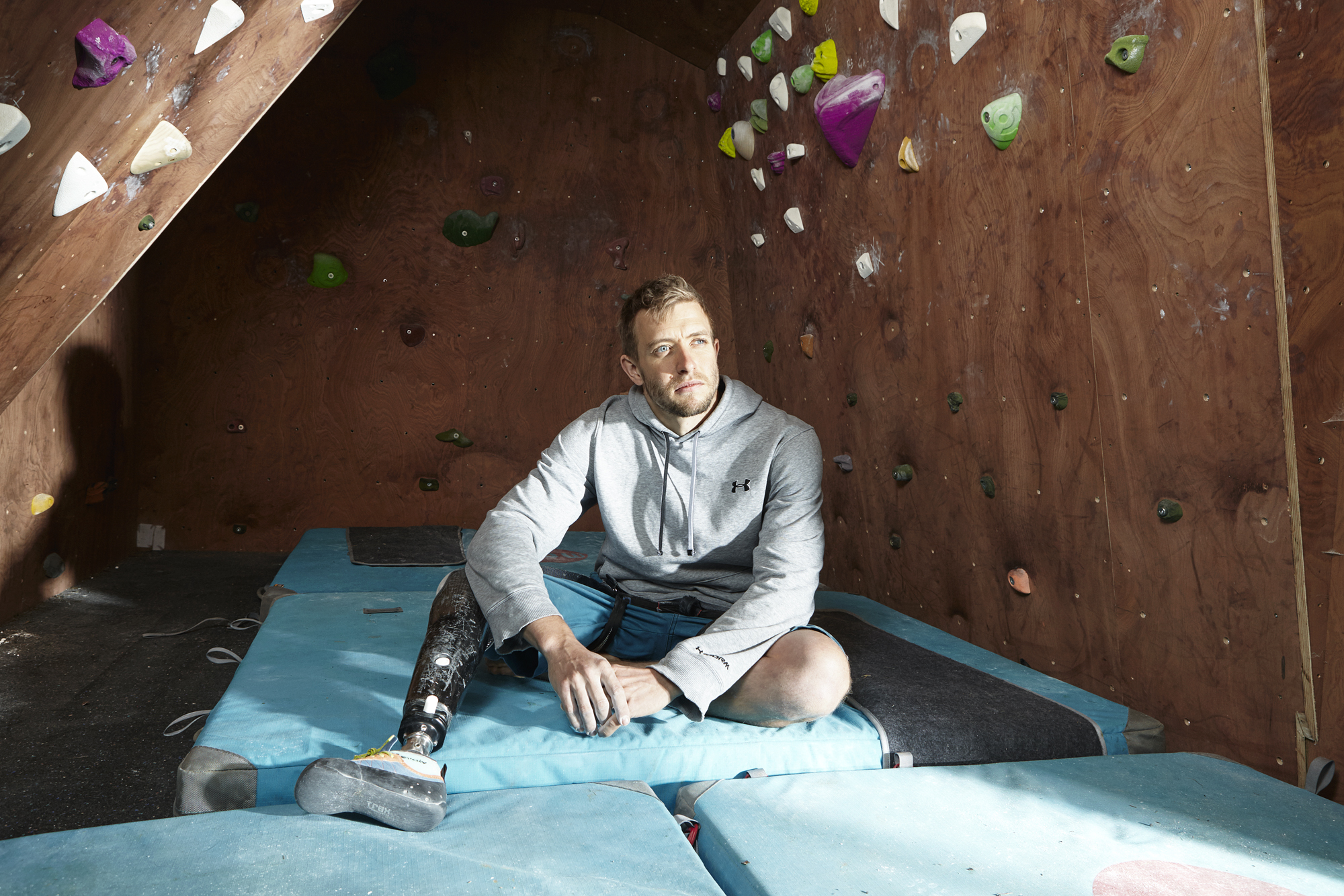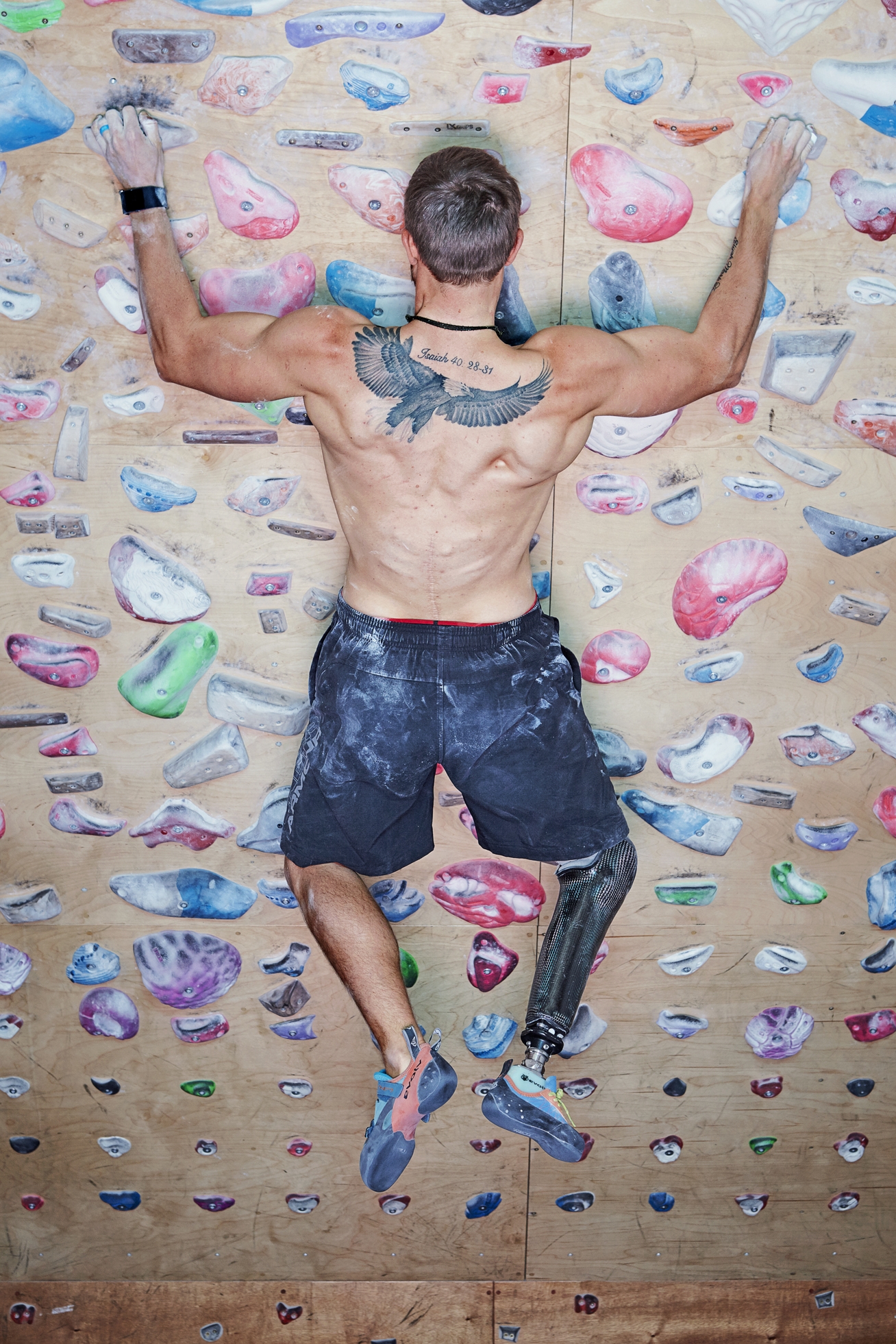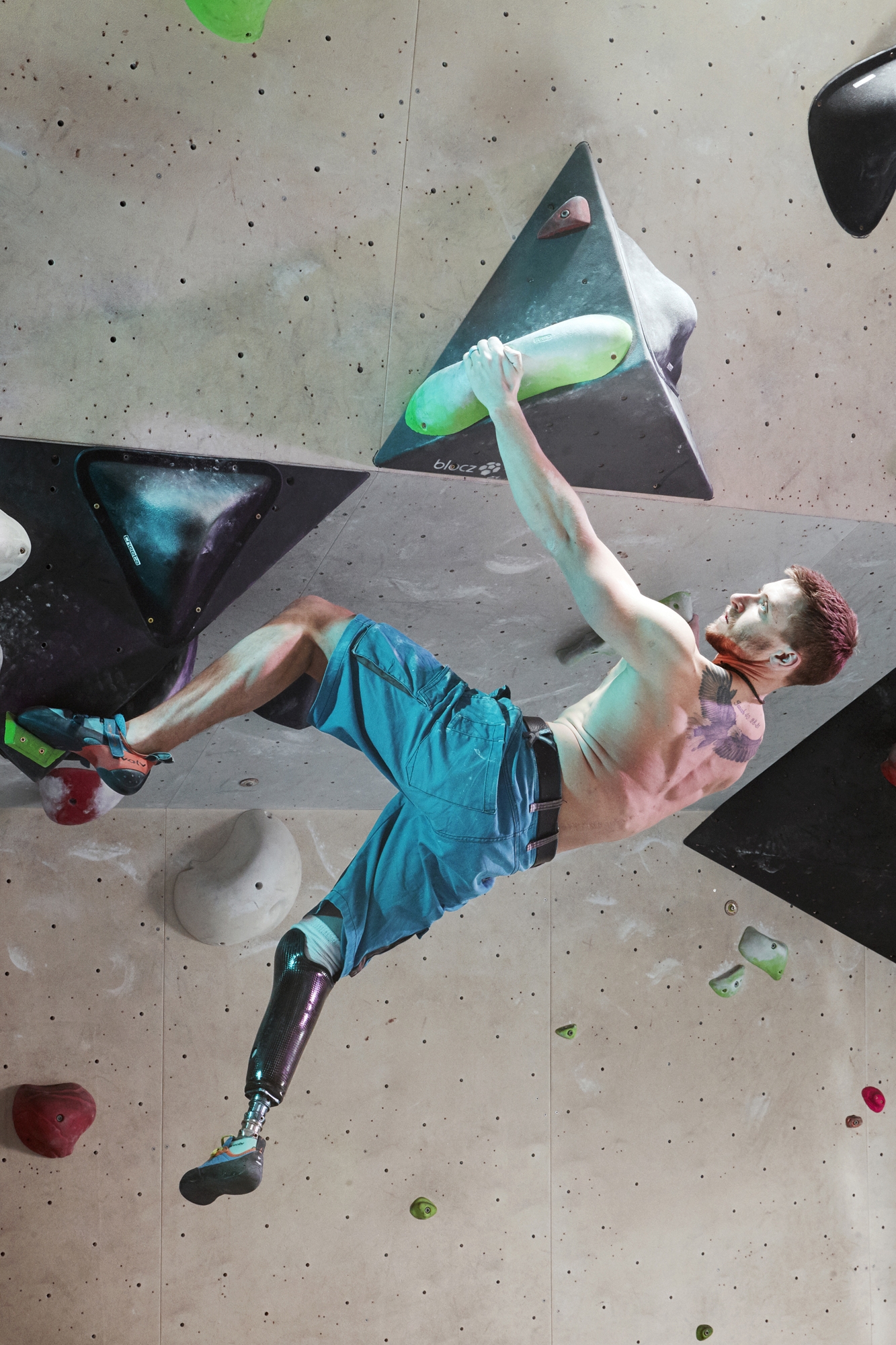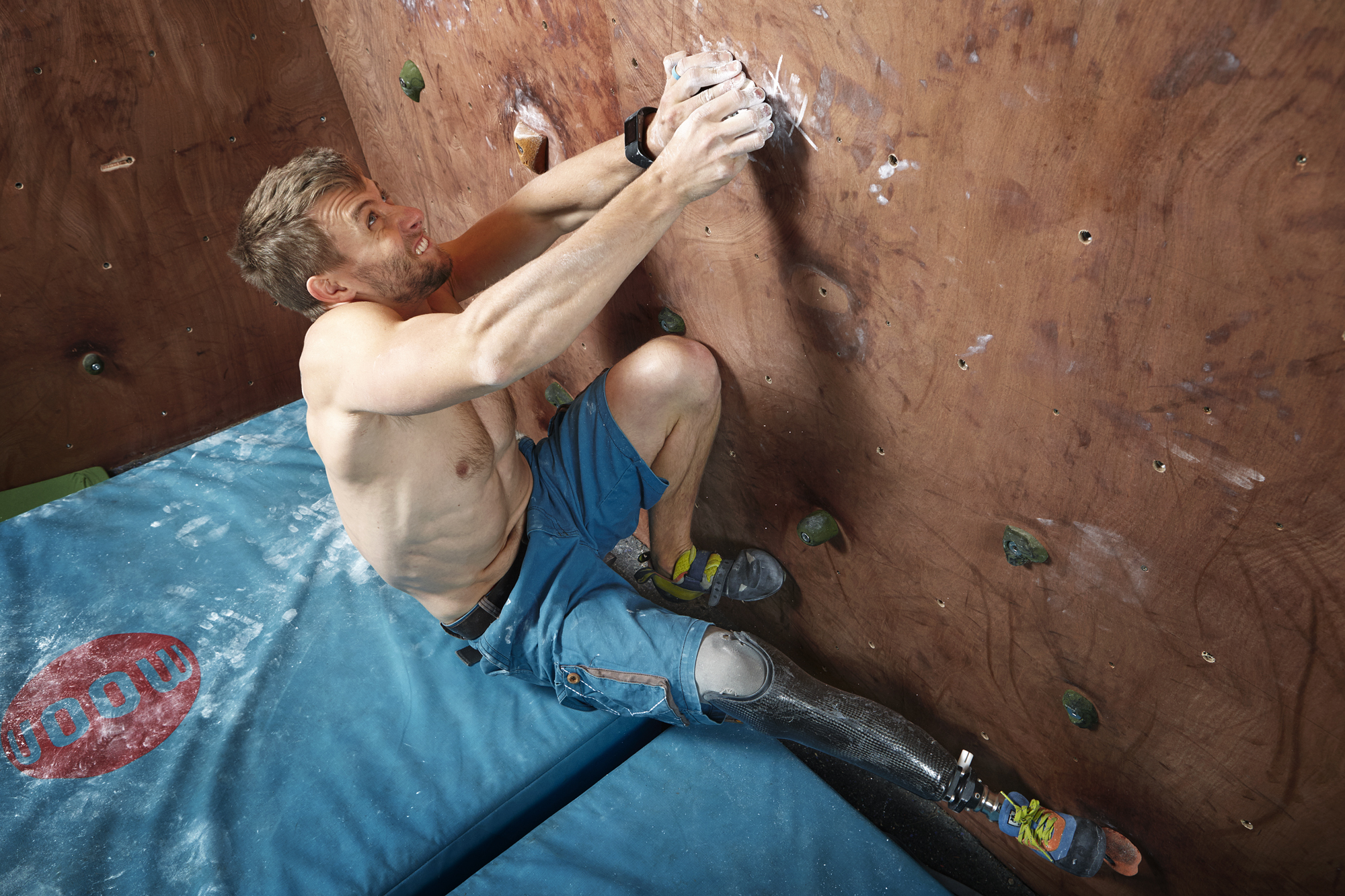The Journey: Josh Senior

The Journey is a series that explores personal progression in climbing.
Eight years ago Josh Senior was employed as an outdoor activities instructor. During a routine day at work he was tasked with fitting a parachute descender, something he had done multiple times before. Harnessed and clipped to a cable, a parachute descender enables you to take a step from a thirty-five foot platform and be lowered in a controlled manner just as a parachute would. Once installed, Josh used the equipment as the quickest route back down. On this occasion though, all was not right. The cable failed and Josh fell to the ground at full velocity.
The resulting impact has left Josh with a metal frame holding together his spine, a below knee amputation of the right leg and a state of perpetual rehab.
The fact that Josh is actually up and mobile is quite something. For him to walk up the aisle unassisted to marry his wife Morgan, and to then raise two young boys in amazing; for him to still be climbing is just short of a miracle. I’m not sure many of us would have found the strength and courage to face this situation with the same absolute determination, drive and love of climbing Josh and Morgan have done.
He is without doubt one of most positive and inspiring people I have ever met. Getting to know him has really put life into perspective for me; somehow everyday problems don’t feel as tough. His thoughts on climbing and life show that if you want to climb, there’s nothing stopping you.
A new beginning
As long as I can remember, I have always climbed. It was something I would naturally do. I was the kid up a tree or on the school roof. When I discovered rock climbing was an actual sport it really excited me. I remember lying in a hospital bed having no feeling from the waist down, thinking there must be a way of me still being able to haul myself up stuff. The desire never went away. Climbing is absolutely my main passion. But I never imagined I’d be in the position I’m in now, climbing for the GB Para Climbing team.
Post-Accident
I’m far more cautious, sometimes perhaps overly so. When I look back, pre-accident I had an absurd belief of being a bit indestructible and some of the things I did were pretty stupid. There were a few close calls. I was more of a trad climber back then and there was a good chance that if I could climb something then I would solo it on a second go.
Post-accident I was adamant I would only ever top rope, to have the security of never taking a significant fall. But then fate played a hand and a bouldering gym opened ten minutes from my house.
I started bouldering—being mindful to keep within my comfort zone—which then moved on to ‘I’ll do routes I’m able to bail on if I need’. I’ve had a couple of scary moments where I’ve gone a bit too far—once finding myself lying on the mat checking I could still move all my body parts. That was enough to make me reign myself in again.
It’s also a very different game now. I’m in a different place with a family to think about; they always come first. I love the outdoors; I’m a country bumpkin at heart. I aim to return to climbing big routes outdoors, but my head game is not there just yet. I’m scared a lot more quickly, even if I’m well under my grade, I guess that’s all part of the recovery process.
Personal Change
Climbing has always been in my life and the drive to get better at climbing has impacted every part of my life. Part of it is the desire to climb harder and achieve more in competitions. More importantly, climbing has helped me become physically and mentally stronger and more resilient. By upping my grade in small increments I’m able to set achievable goals that consequently benefit day-to-day life outside of climbing. The drive to climb has enabled me to become a more capable dad. For example, a year ago if I’d have set the goal of being able to pick up my kids without a thought, it would have seemed too ambitious. This is something that has happened as a result of my training. I can bend down and pick up my boys if they fall; okay, it's going to hurt a bit, but I don’t worry about the consequences of it as I used to.
I consider myself lucky in many ways. Of course I wish the accident had not happened. But learning how to really dig deep has helped me evolve as a person and it has had a huge effect on me both as a husband and as a father. It’s also allowed me experiences I’d never have had; international climbing, disappearing off to Rocklands at the blink of an eye. By accepting it and making good come from it, life is actually pretty great.
When I’m on the wall I have total focus and a real connection with myself. When, in that controlled moment, you feel completely right because you are so in tune with your body. The minute you’re beyond that though, the feeling changes to all-encompassing panic!
Advice To Others
I love a quote by Alex Lowe: “The best climber is the one having the most fun”. That’s a real key element of climbing. You can get caught up in training and sometimes you can forget why you’re doing it. I like to have a couple of sessions that are just to enjoy it with no training element to remind myself why I’m climbing. If the joy goes, then what’s the point?
I climb at my best when I have a clear head, when I’ve told myself this is not a training session, I’m just going to climb with my mates and have fun. This is often when I find myself crushing problems. I’m working at trying to attain this composure for competitions, as I still get really nervous before I compete.
From my point of view, climbing is the best kind of rehab imaginable. There are many consultants that would probably disagree with me, though. For the type of spinal injury I have, the key things I needed to work on were core strength, back strength and leg strength; all three of which climbing works to varying degrees. As long as I’m being careful and putting sensible measures in place, I think it’s the perfect sport for me to be doing and again it’s so accessible to all.
Get to a wall and give it a go. Good walls are popping up all over at the moment and I’ve never been to a wall that was not a friendly environment. Climbing is so accessible for everyone. I have one leg and a spinal injury, I know other people who climb with one arm, I know people who are blind and climb by feel. The bulk of people who go to the climbing wall will be there for fun and for the social aspect. I know people who will go even when they are injured just to be there, not climbing but on the mat with their mates watching and throwing out bits of advice.
London based climber and photographer








